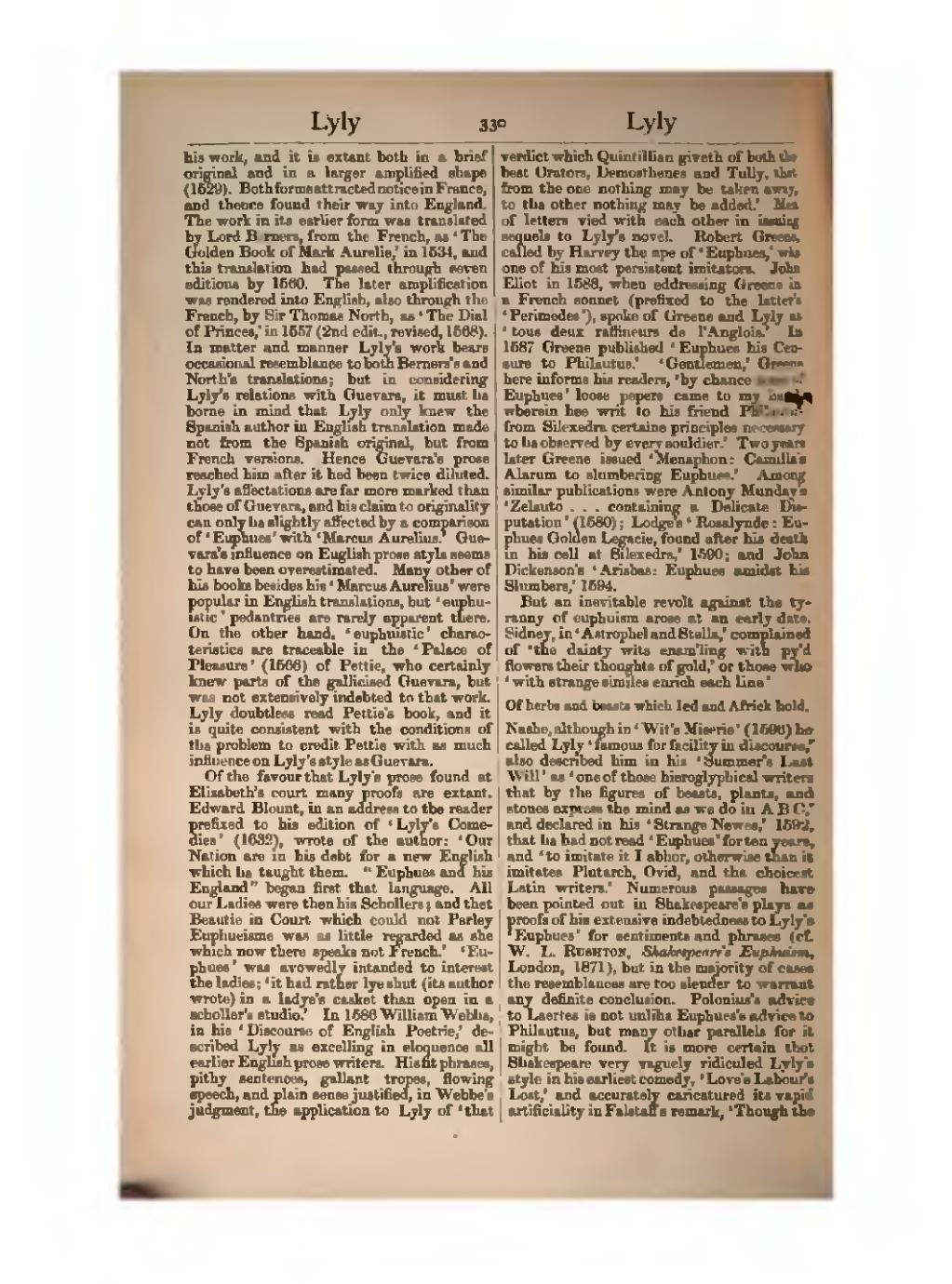his work, and it is extant both in a brief original and in a larger amplified shape (1529). Both forms attracted notice in France, and thence found their way into England. The work in its earlier form was translated by Lord Berners, from the French, as 'The Golden Book of Mark Aurelie,' in 1534, and this translation had passed through seven editions by 1580. The later amplification was rendered into English, also through the French, by Sir Thomas North, as 'The Dial of Princes," in 1557 (2nd edit., revised, 1668). In matter and manner Lyly's work bears occasional resemblance to both Berners's and North's translations; but in considering Lyly's relations with Guevara, it must be borne in mind that Lyly only knew the Spanish author in English translation made not from the Spanish original, hut from French versions. Hence Guevara's prose reached him after it had been twice diluted. Lyly's affectations are far more marked than those of Guevara, and his claim to originality can only he slightly affected by a comparison of 'Euphues' with 'Marcus Aurelius.' Guevara's iniluence on English prose style seems to have been overestimated. Many other of his books besides his 'Marcus Aurelius' were popular in English translations, but 'euphuistic' pedantries are rarely apparent there. On the other hand, 'euphuistic' charac- teristics are traceable in the 'Palace of Pleasure' (1566) of Pettie, who certainly knew parts of the galliciaed Quevara, but was not extensively indebted to that work. Lyly doubtless read Pettie's book, and it is quite consistent with the conditions of the problem to credit Pettie with as much influence on Lyly's style as Guevara.
Of the favour that Lyly's prose found at Elizabeth's court many proofs are extant. Edward Blount, in an address to the reader prefixed to his edition of 'Lyly's Comedies' (1632), wrote of the author: 'Our Nation are in his debt for a new English which he taught them. "Euphues and his England" began first that language. All our Ladies were then his Schollers; and that Beautie in Court which could not Parley Euphueisme was as little regarded as she which now there speaks not French.' 'Euphues' was avowedly intended to interest the ladies; 'it had rather lye shut (its author wrote) in a ladye's casket than open in a scholler's studio.' In 1586 William Webbe, in his 'Discourse of English Poetrie,' described Lyly as excelling in eloquence all earlier English prose writers. His fit phrases, pithy sentences, gallant trmies, flowing speech, and plain sense justified, in Webbe's judgment, the application to Lyly of 'that verdict which Quintillian giveth of both the best Orators, Demosthenes and Tully, that from the one nothing may be taken to the other nothing may be added.' Men of letters vied with each other in issuing sequels to Lyly's novel. Robert Greene, called by Harvey the ape of 'Euphues,' was one of his most persistent imitators. John Eliot in 1588, when addressing Greene in a French sonnet (prefixed to the latter's 'Perimedes'), spoke of Greene and Lyly as 'tous deux rastineurs de l'Anglois.' In 1587 Greene published 'Euphues his Censure to Philautus.' 'Gentlemen,' Greene here informs his readers, 'by chance some of Euphues' loose papers came to my hand, wherein hee writ to his friend Philotid from Silexedra certaine principles necessary to be observed by every souldier.' Two years later Greene issued 'Menaphon: Camilla's Alarum to slumbering Euphues.' Among similar publications were Antony Munday's 'Zelauto . . . containing a Delicate Disputation' (1580); Lodge's 'Rosalynde: Euphues Golden Legacie, found after his death in his cell at Silexedra,' 1590; and John Dickenson's 'Arisbas: Euphues amidst his Slumbers,' 1594.
But an inevitable revolt against the tyranny of euphuism arose at an early date. Sidney, in 'Astrophel and Stella,' complained of 'the dainty wits enam'ling with py'd flowers their thoughts of gold,' or those who 'with strange similes enrich each line'
- Of herbs and beasts which Ind and Africk hold.
Nashe, although in 'Wit's Miserie' (1506) called Lyly 'famous for facility in discourse,' also described him in his 'Summer's Last Will' as 'one of those hieroglyphical writers that by the figures of beasts, plants, and stones express the mind as we do in A B C,' and declared in his 'Strange Newes,' 1592, 'that he had not read Euphues for ten years, I and 'to imitate it I abhor, otherwise than it' imitates Plutarch, Ovid, and the choicest Latin writers.' Numerous passages have been pointed out in Shakespeare's plays as proofs of his extensive indebtedness to Lyly's 'Euphues' for sentiments and phrases (cf. W. L. Rushton, Shakespeare's Euphuism, London, 1871), but in the majority of cases the resemblances are too slender to warrant any definite conclusion. Polonius's advice to Laertes is not unlike Euphues's advice to Philautus, but many other parallels for it might be found. It is more certain that Shakespeare very vaguely ridiculed Lyly's style in his earliest comedy, 'Love's Labour's Lost,' and accurately caricatured its vapid artificiality in Falaff's remark, 'Though the
